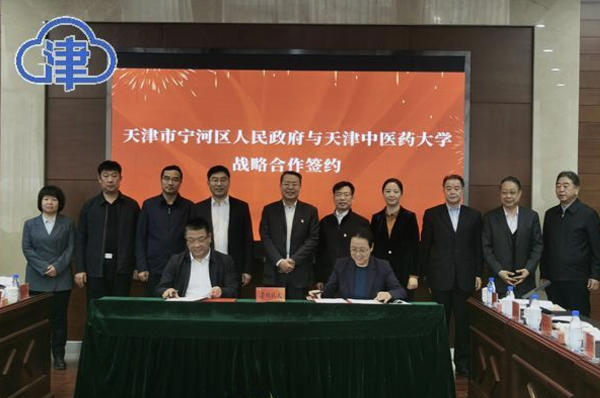On January 5, the signing ceremony of the strategic cooperation agreement between Tianjin Ninghe People's Government and the Tianjin University of Traditional Chinese Medicine (TUTCM) was held. Based on the agreement, the TUTCM will make full use of its advantages in teaching and scientific research technology to promote the further development of the traditional Chinese medicine and health care industry in Ninghe district.

A group photo of the signing ceremony [Photo/WeChat account: Jinyun]
According to the agreement, focusing on cooperation in the fields on health care, industry, ecology, education and culture, the two sides will explore a new path of win-win cooperation between the university and local government, and enhance the ability of both sides to jointly achieve the inheritance and innovation of traditional Chinese medicine through the establishment of a student internship practice base, a docking mechanism for enrollment and employment, and a training system for senior talent teams in enterprises and public institutions. Cooperation between the two sides will help Tianjin build into a "leading city in China and a world famous city with strong traditional Chinese medicine".
The two sides will also establish an "employment base", establish an employment training model for enterprises to attract graduates, and establish a "zero distance" docking mechanism between talent training and industrial demand. The establishment of the Ninghe Hospital of Traditional Chinese Medicine as a Class III Grade A hospital will be supported, and the hospital will be recognized as the "Ninghe Branch of the Second Affiliated Hospital of the TUTCM".
The two sides will rely on the development layout of Ninghe district to build a Chinese medicine industry base, giving full play to the resource advantages of both sides to cultivate and introduce well-known enterprises to settle in the area, and to promote the development of related industries, such as the R&D of new Chinese medicine, the manufacturing and promotion of key intelligent equipment of Chinese medicine, and the R&D of Chinese medicinal equipment. Through industrial development and the characteristic resources of Ninghe in the planting and processing of traditional Chinese medicine, biomedicine, medical health care and other aspects, Ninghe will strive to build a Chinese medicine cultural tourism system.
Liu Gesheng, secretary of the CPC TUTCM Committee, said that the signing of the cooperation framework agreement is of great significance for promoting the strategic cooperation between the university and the local government. TUTCM will give full play to its advantages in scientific research, clinical diagnosis and treatment, carrying out multi-level exchanges and cooperation with Ninghe district in the development of the traditional Chinese medicine industry, personnel training, and scientific and technological innovation.
Bai Fengxiang, secretary of the CPC Ninghe District Committee, said that Ninghe will seize this opportunity to provide better medical services for the local people and push the region's medical and health undertakings to a new level.





